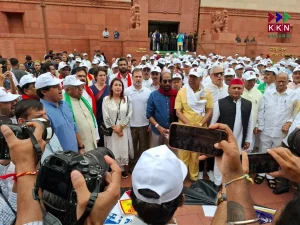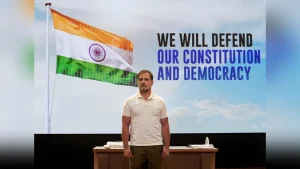The Bharatiya Janata Party has launched a scathing attack on prominent opposition leaders, making serious allegations that could reshape India’s political landscape. In a dramatic press conference held on August 13, 2025, the BJP alleges election irregularities in multiple parliamentary constituencies, targeting some of the most high-profile names in Indian politics.
 Former Union Minister Anurag Thakur spearheaded the BJP’s offensive, demanding immediate resignations from several opposition MPs. The BJP alleges election irregularities in Rae Bareli, Wayanad, Diamond Harbour, and Kannauj parliamentary seats, directly challenging the electoral victories of Rahul Gandhi, Priyanka Gandhi Vadra, Abhishek Banerjee, and Akhilesh Yadav, respectively.
Former Union Minister Anurag Thakur spearheaded the BJP’s offensive, demanding immediate resignations from several opposition MPs. The BJP alleges election irregularities in Rae Bareli, Wayanad, Diamond Harbour, and Kannauj parliamentary seats, directly challenging the electoral victories of Rahul Gandhi, Priyanka Gandhi Vadra, Abhishek Banerjee, and Akhilesh Yadav, respectively.
The allegations extend beyond parliamentary constituencies, with Thakur also questioning the legitimacy of victories in the Kolathur Assembly seat in Tamil Nadu and the Mainpuri Lok Sabha seat in Uttar Pradesh. Tamil Nadu Chief Minister M.K. Stalin and Samajwadi Party leader Dimple Yadav have been specifically named in these accusations.
The central claim revolves around what the BJP terms “vote chori” or vote theft. BJP alleges election irregularities through systematic manipulation of voter rolls, creating what they describe as fake voters across multiple constituencies. Thakur’s presentation included detailed allegations of fraudulent voter registration practices that allegedly benefited opposition candidates.
Also Read: BJP alleges election irregularities
More from us: Opposition march to the ECI
“Rae Bareli, Wayanad, Kannauj, to Diamond Harbour — one question is coming up everywhere — why did they make fake voters?” Thakur questioned, directly challenging the integrity of electoral processes in these key constituencies. The allegations suggest a coordinated effort to manipulate voter databases to secure electoral advantages.
The timing of these allegations is particularly significant, coming amid ongoing parliamentary disruptions over electoral reforms. The BJP alleges election irregularities specifically target constituencies represented by India’s most prominent opposition figures, including the Leader of Opposition Rahul Gandhi and Congress General Secretary Priyanka Gandhi Vadra.
Thakur’s accusations extend to claiming that these leaders secured their victories through systematic manipulation of electoral processes. The allegations suggest that irregular voter registration practices enabled these victories, undermining the democratic mandate these leaders claim to represent.
The controversy centres around the Special Intensive Revision (SIR) of the electoral rolls, currently being implemented in Bihar and planned for other states. The BJP alleges election irregularities are being exposed through this comprehensive review process, which aims to cleanse voter rolls of fraudulent entries.
 Opposition parties have been demanding parliamentary discussion on the Bihar SIR, alleging irregularities in the process itself. However, the BJP has turned these concerns around, suggesting that opposition protests stem from fear of exposure rather than genuine procedural concerns.
Opposition parties have been demanding parliamentary discussion on the Bihar SIR, alleging irregularities in the process itself. However, the BJP has turned these concerns around, suggesting that opposition protests stem from fear of exposure rather than genuine procedural concerns.
Adding another dimension to the controversy, Thakur accused opposition parties of protecting what he termed “a vote bank of illegal Bangladeshi infiltration” and other “intruders.” The BJP alleges election irregularities are partially designed to shield irregular voters from scrutiny, suggesting a broader pattern of electoral manipulation involving foreign nationals.
These allegations connect electoral irregularities to immigration concerns, suggesting that opposition parties have systematically enrolled ineligible voters to boost their electoral prospects. The claims imply a complex web of electoral fraud involving both domestic manipulation and foreign interference.
The BJP’s offensive comes in response to Rahul Gandhi’s own allegations of “vote chori” made on August 7, 2025. Gandhi had claimed that over one lakh votes were stolen in Karnataka’s Mahadevapura Assembly segment through five types of manipulation, including duplicate voters and fake addresses.
However, the BJP alleges election irregularities by opposition parties themselves, essentially turning Gandhi’s accusations back on him and his allies. This has created a complex web of mutual accusations that has paralysed parliamentary proceedings.
The BJP has escalated beyond mere allegations, demanding actual resignations from the accused leaders. BJP alleges election irregularities warrant immediate stepping down of these MPs and MLAs, arguing that their mandates are illegitimate due to electoral manipulation.
Thakur specifically called for resignations from Rahul Gandhi, Priyanka Gandhi Vadra, Abhishek Banerjee, Akhilesh Yadav, M.K. Stalin, and Dimple Yadav, suggesting these leaders cannot continue representing constituencies they allegedly won through fraudulent means.
The allegations carry significant political implications, potentially delegitimising some of the opposition’s most important leaders. The BJP alleges election irregularities at a time when opposition unity is crucial for challenging the ruling party’s dominance.


The Election Commission of India finds itself at the centre of this controversy, with both sides making competing claims about electoral integrity. The BJP alleges election irregularities while simultaneously defending the commission against opposition criticism.
The commission’s handling of the SIR process and response to these allegations will likely determine public confidence in electoral processes going forward.
As the BJP alleges election irregularities across multiple states and constituencies, India faces a crisis of electoral confidence that threatens democratic stability. The serious nature of these allegations demands a thorough investigation and a transparent resolution to maintain public faith in democratic institutions.
The political stakes could not be higher, with some of India’s most prominent leaders facing questions about the legitimacy of their electoral mandates. How this controversy unfolds will likely shape India’s political landscape for years to come.

